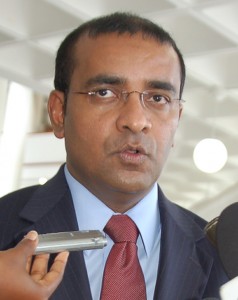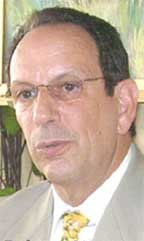Although the US government said it seized the surveillance equipment owned by alleged Guyanese drug kingpin Roger Khan after it was shipped to his lawyer’s New York offices, Commissioner of Police Henry Greene is maintaining that local authorities have the equipment in their custody.

President Bharrat Jagdeo made this disclosure yesterday, saying that Greene confirmed it when he asked him about it. “He [Greene] said we have it in our possession,” Jagdeo told a news conference at the Office of the President. “I asked him and he said that we have the equipment here.”
Khan is imprisoned in the US, where he is awaiting trial for conspiracy to import shipments of cocaine into that country.
But President Jagdeo’s revelation gives credence to a report that there might have been a switch of equipment given to local authorities. Stabroek News was told that surveillance equipment was confiscated from Khan when he was arrested in 2002 and handed over to the government. It was then passed back to Khan at a later stage, Stabroek News understands, while similar equipment was handed back to the police under the guise that it was what was originally seized. At one time the army had said that it had turned over the equipment to the police but the police later indicated it did not know of its whereabouts.
Reports had indicated that the laptop was capable of intercepting and tracing telephone calls made from a landline or a cellular phone and the software was reportedly only sold to governments. The then Home Affairs Minister Ronald Gajraj had said that the use of the instrument did not breach any of the laws of Guyana.
Meanwhile, Cabinet Secretary Dr Roger Luncheon later admitted that his government did business with Khan, but denied that he ever signed any document authorising the businessman to import the equipment or colluded with him.
While Luncheon maintained that he had no idea where the equipment was, Home Affairs Minister Clement Rohee declined any comment on the matter. Asked about the apparent uncertainty within the administration about the whereabouts of the equipment, Jagdeo yesterday said, “People don’t want to speak, but I will speak and he [Greene] said it is here.”
According to court papers seen by Stabroek News, the specialised telephonic equipment allegedly used by Khan was among the items seized from the New York office of his attorney Robert Simels during an investigation. Simels is now facing witness tampering charges in the US. Questions had been raised as to what had happened to the equipment, which had been discovered in 2002 in a vehicle Khan and others were in by members of the Guyana Defence Force’s (GDF) Intelligence Unit. It has since been alleged that Khan used the equipment to improperly wiretap the calls of various high-ranking officials and others within Guyana in order to maintain his operations.

In an affidavit in support of a search warrant executed on Simels’ office, Drug Enforcement Administration (DEA) officer Cassandra Jackson said the equipment was shipped by the lawyer to his York Avenue, New York office. She said Simels had planned to use conversations recorded on the equipment during Khan’s trial.
Jackson said the information about the equipment was gleaned during recorded conversations between Simels and the US government’s confidential source some months before Simels, his assistant, Arianne Irving, and Khan were hauled before the court on witness tampering charges arising out of Khan’s indictment on conspiracy to import cocaine into the US. The government’s source informed the DEA that prior to his arrest Khan used a computer while in Guyana to surreptitiously record telephone conversations of individuals.
Jackson said she believed the conversations referred to by Simels were captured using Khan’s eavesdropping equipment that was in his possession. Records maintained by the Department of Homeland Security’s, Bureau of Customs and Border Protection, show that on or about October 11, 2007, prior to the disclosure of the recorded conversations, equipment identified as a ‘Portable Auto Data Processing Machine’ was shipped from Guyana to Simels.
This would mean that it was returned to Khan after he had been acquitted on charges stemming from the 2002 interception. Jackson said the records also indicated that from October 9, 2007 to October 12, 2007, Simels was in Guyana and that during one of the recorded conversations with the source had confirmed he had the equipment.
The US government was subsequently granted permission to seize the equipment and other computers and material from Simels’ office following his arrest and the information is now being sifted through by court-appointed persons.
Last year Simels had said that Khan had received permission from the Guyana government to purchase the equipment from the Spy Shop in Fort Lauderdale, Florida, an allegation the government had denied.
